Corporate Culture and its Effects on Organizational Psychology
VerifiedAdded on 2023/06/10
|9
|1600
|103
Essay
AI Summary
This essay delves into the significant influence of corporate culture on organizational psychology, examining how beliefs and behaviors shape the interactions and transactions within an organization. It identifies five main types of corporate cultures: team-first, elite, horizontal, conventional, and progressive, each with distinct characteristics and impacts on employee satisfaction, customer relations, and overall organizational growth. The essay further explores the positive effects of a good corporate culture, such as improved customer service, accurate performance appraisals, and increased employee responsibility, while also addressing the negative impacts of a poor corporate culture, including poor discipline and hypercompetitive environments. Ultimately, it emphasizes the critical role of a positive corporate culture in fostering ethical behavior, enhancing employee satisfaction, and driving organizational success. Desklib offers similar essays and study tools for students.
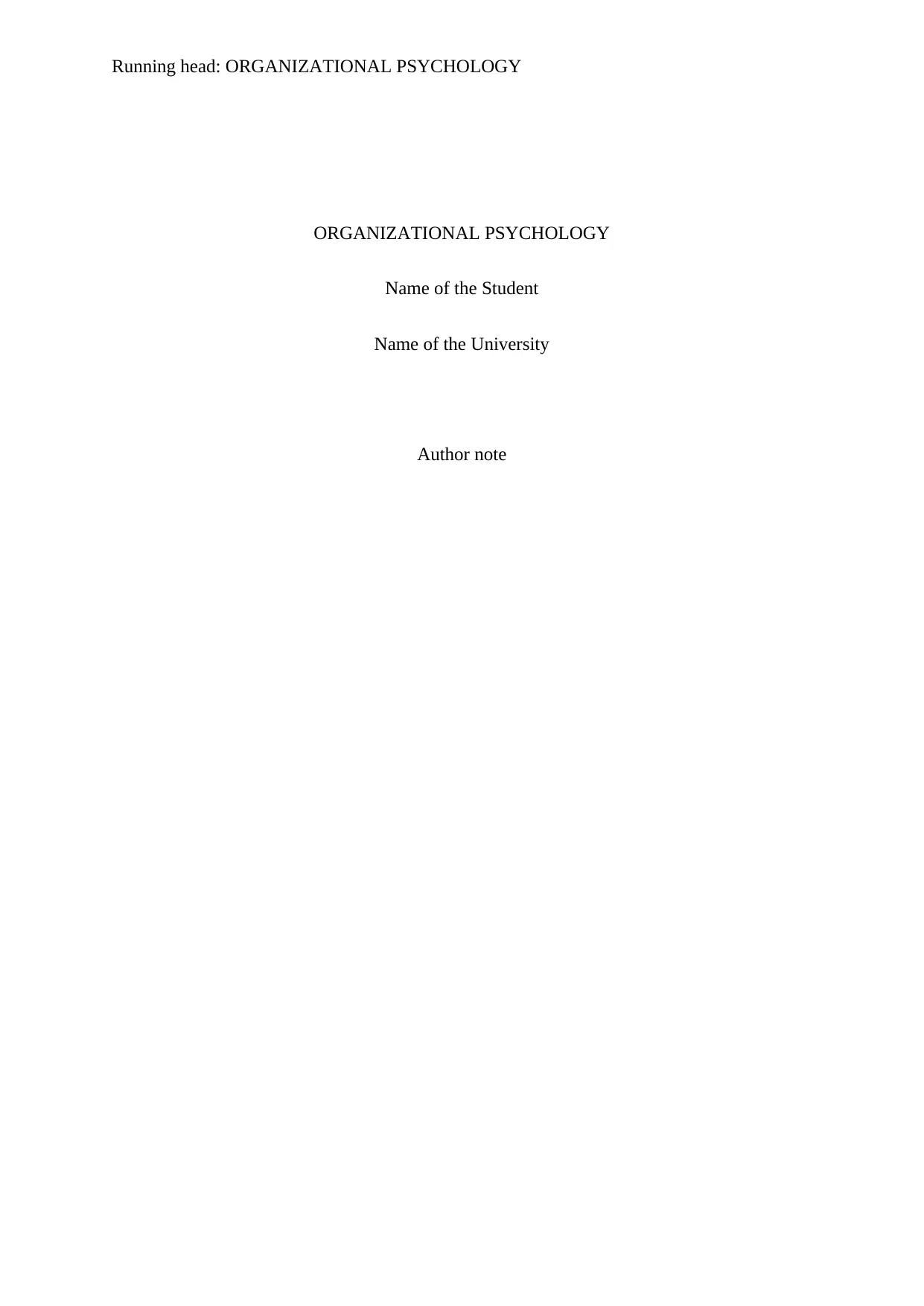
Running head: ORGANIZATIONAL PSYCHOLOGY
ORGANIZATIONAL PSYCHOLOGY
Name of the Student
Name of the University
Author note
ORGANIZATIONAL PSYCHOLOGY
Name of the Student
Name of the University
Author note
Paraphrase This Document
Need a fresh take? Get an instant paraphrase of this document with our AI Paraphraser
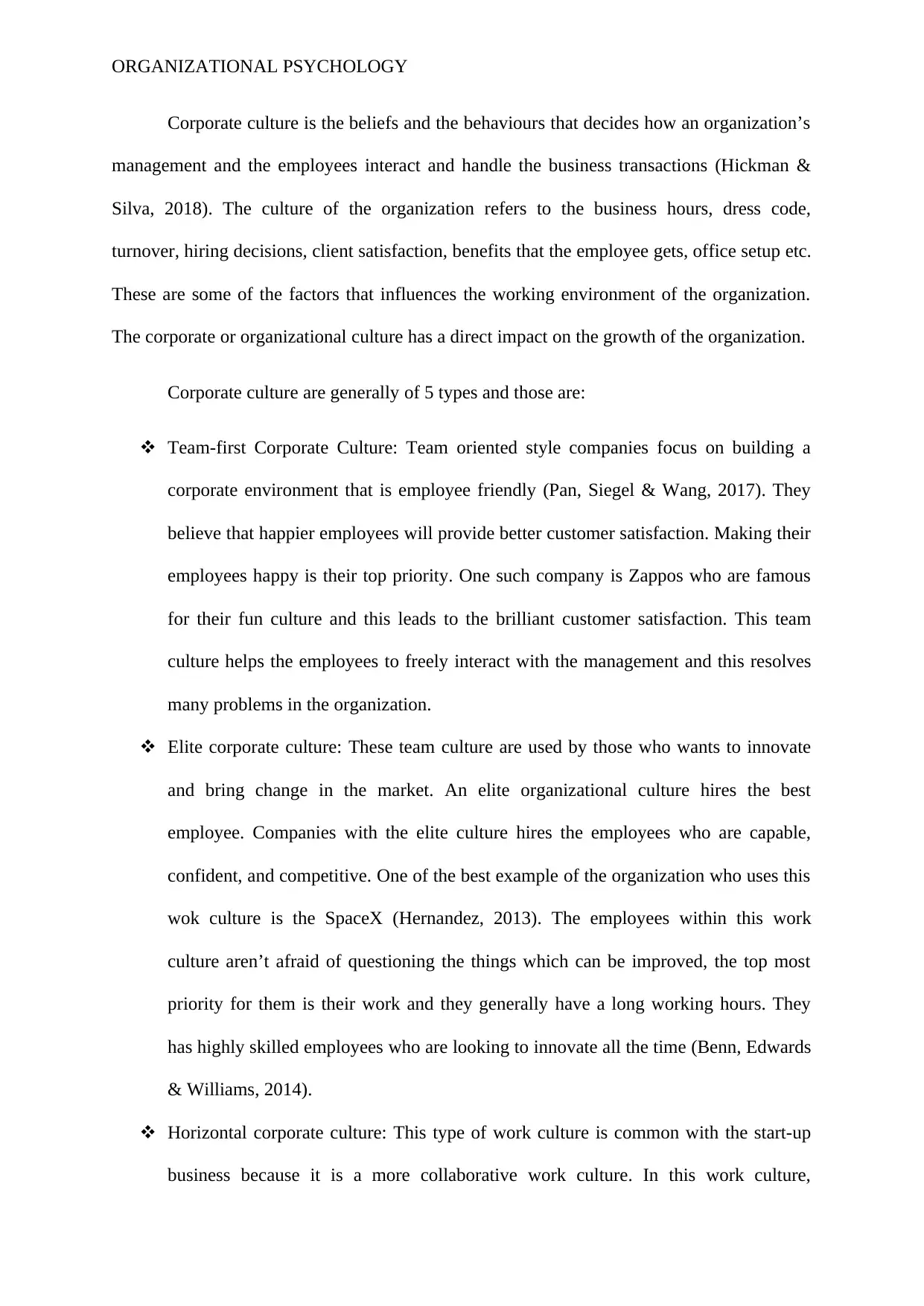
ORGANIZATIONAL PSYCHOLOGY
Corporate culture is the beliefs and the behaviours that decides how an organization’s
management and the employees interact and handle the business transactions (Hickman &
Silva, 2018). The culture of the organization refers to the business hours, dress code,
turnover, hiring decisions, client satisfaction, benefits that the employee gets, office setup etc.
These are some of the factors that influences the working environment of the organization.
The corporate or organizational culture has a direct impact on the growth of the organization.
Corporate culture are generally of 5 types and those are:
Team-first Corporate Culture: Team oriented style companies focus on building a
corporate environment that is employee friendly (Pan, Siegel & Wang, 2017). They
believe that happier employees will provide better customer satisfaction. Making their
employees happy is their top priority. One such company is Zappos who are famous
for their fun culture and this leads to the brilliant customer satisfaction. This team
culture helps the employees to freely interact with the management and this resolves
many problems in the organization.
Elite corporate culture: These team culture are used by those who wants to innovate
and bring change in the market. An elite organizational culture hires the best
employee. Companies with the elite culture hires the employees who are capable,
confident, and competitive. One of the best example of the organization who uses this
wok culture is the SpaceX (Hernandez, 2013). The employees within this work
culture aren’t afraid of questioning the things which can be improved, the top most
priority for them is their work and they generally have a long working hours. They
has highly skilled employees who are looking to innovate all the time (Benn, Edwards
& Williams, 2014).
Horizontal corporate culture: This type of work culture is common with the start-up
business because it is a more collaborative work culture. In this work culture,
Corporate culture is the beliefs and the behaviours that decides how an organization’s
management and the employees interact and handle the business transactions (Hickman &
Silva, 2018). The culture of the organization refers to the business hours, dress code,
turnover, hiring decisions, client satisfaction, benefits that the employee gets, office setup etc.
These are some of the factors that influences the working environment of the organization.
The corporate or organizational culture has a direct impact on the growth of the organization.
Corporate culture are generally of 5 types and those are:
Team-first Corporate Culture: Team oriented style companies focus on building a
corporate environment that is employee friendly (Pan, Siegel & Wang, 2017). They
believe that happier employees will provide better customer satisfaction. Making their
employees happy is their top priority. One such company is Zappos who are famous
for their fun culture and this leads to the brilliant customer satisfaction. This team
culture helps the employees to freely interact with the management and this resolves
many problems in the organization.
Elite corporate culture: These team culture are used by those who wants to innovate
and bring change in the market. An elite organizational culture hires the best
employee. Companies with the elite culture hires the employees who are capable,
confident, and competitive. One of the best example of the organization who uses this
wok culture is the SpaceX (Hernandez, 2013). The employees within this work
culture aren’t afraid of questioning the things which can be improved, the top most
priority for them is their work and they generally have a long working hours. They
has highly skilled employees who are looking to innovate all the time (Benn, Edwards
& Williams, 2014).
Horizontal corporate culture: This type of work culture is common with the start-up
business because it is a more collaborative work culture. In this work culture,
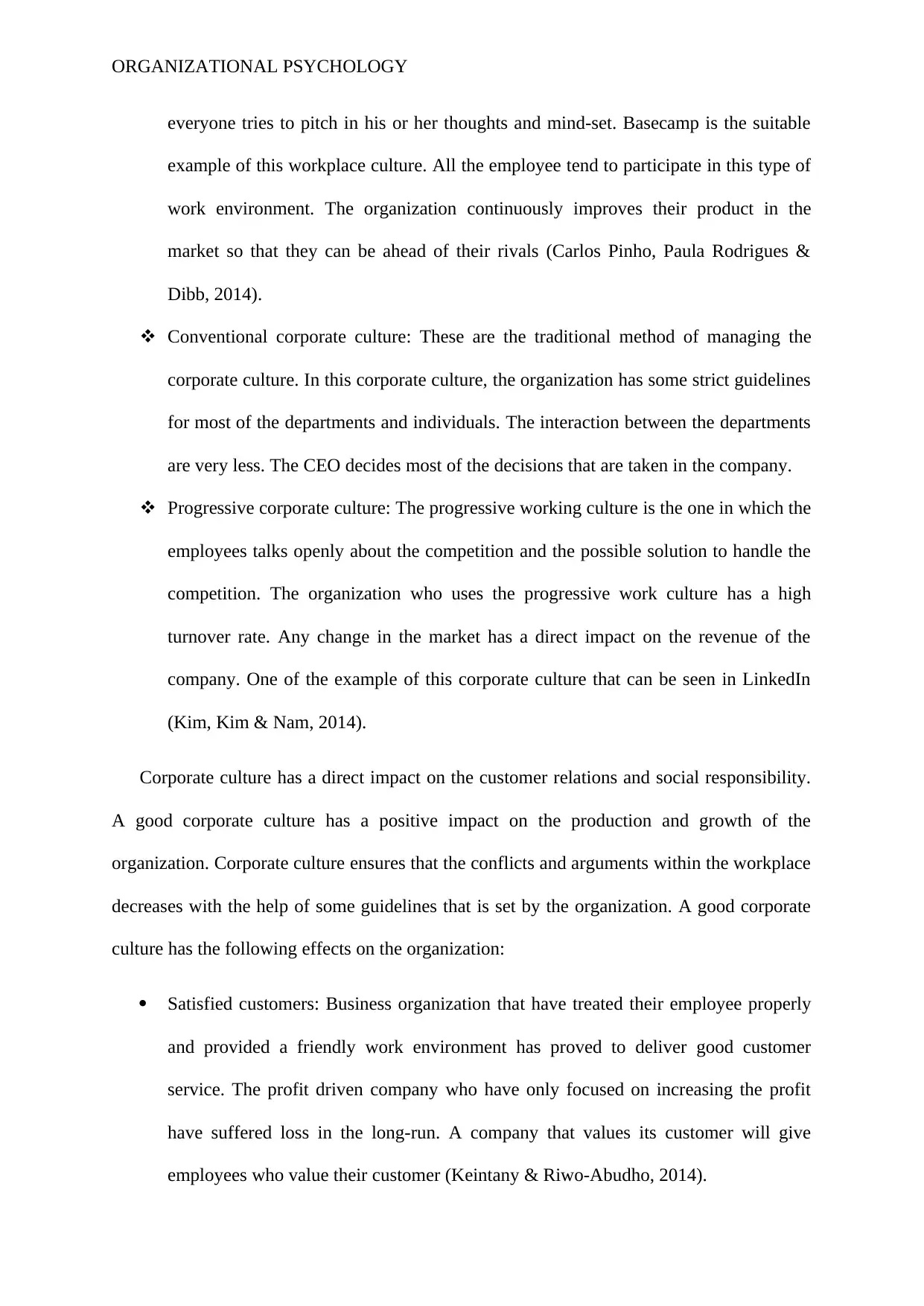
ORGANIZATIONAL PSYCHOLOGY
everyone tries to pitch in his or her thoughts and mind-set. Basecamp is the suitable
example of this workplace culture. All the employee tend to participate in this type of
work environment. The organization continuously improves their product in the
market so that they can be ahead of their rivals (Carlos Pinho, Paula Rodrigues &
Dibb, 2014).
Conventional corporate culture: These are the traditional method of managing the
corporate culture. In this corporate culture, the organization has some strict guidelines
for most of the departments and individuals. The interaction between the departments
are very less. The CEO decides most of the decisions that are taken in the company.
Progressive corporate culture: The progressive working culture is the one in which the
employees talks openly about the competition and the possible solution to handle the
competition. The organization who uses the progressive work culture has a high
turnover rate. Any change in the market has a direct impact on the revenue of the
company. One of the example of this corporate culture that can be seen in LinkedIn
(Kim, Kim & Nam, 2014).
Corporate culture has a direct impact on the customer relations and social responsibility.
A good corporate culture has a positive impact on the production and growth of the
organization. Corporate culture ensures that the conflicts and arguments within the workplace
decreases with the help of some guidelines that is set by the organization. A good corporate
culture has the following effects on the organization:
Satisfied customers: Business organization that have treated their employee properly
and provided a friendly work environment has proved to deliver good customer
service. The profit driven company who have only focused on increasing the profit
have suffered loss in the long-run. A company that values its customer will give
employees who value their customer (Keintany & Riwo-Abudho, 2014).
everyone tries to pitch in his or her thoughts and mind-set. Basecamp is the suitable
example of this workplace culture. All the employee tend to participate in this type of
work environment. The organization continuously improves their product in the
market so that they can be ahead of their rivals (Carlos Pinho, Paula Rodrigues &
Dibb, 2014).
Conventional corporate culture: These are the traditional method of managing the
corporate culture. In this corporate culture, the organization has some strict guidelines
for most of the departments and individuals. The interaction between the departments
are very less. The CEO decides most of the decisions that are taken in the company.
Progressive corporate culture: The progressive working culture is the one in which the
employees talks openly about the competition and the possible solution to handle the
competition. The organization who uses the progressive work culture has a high
turnover rate. Any change in the market has a direct impact on the revenue of the
company. One of the example of this corporate culture that can be seen in LinkedIn
(Kim, Kim & Nam, 2014).
Corporate culture has a direct impact on the customer relations and social responsibility.
A good corporate culture has a positive impact on the production and growth of the
organization. Corporate culture ensures that the conflicts and arguments within the workplace
decreases with the help of some guidelines that is set by the organization. A good corporate
culture has the following effects on the organization:
Satisfied customers: Business organization that have treated their employee properly
and provided a friendly work environment has proved to deliver good customer
service. The profit driven company who have only focused on increasing the profit
have suffered loss in the long-run. A company that values its customer will give
employees who value their customer (Keintany & Riwo-Abudho, 2014).
⊘ This is a preview!⊘
Do you want full access?
Subscribe today to unlock all pages.

Trusted by 1+ million students worldwide
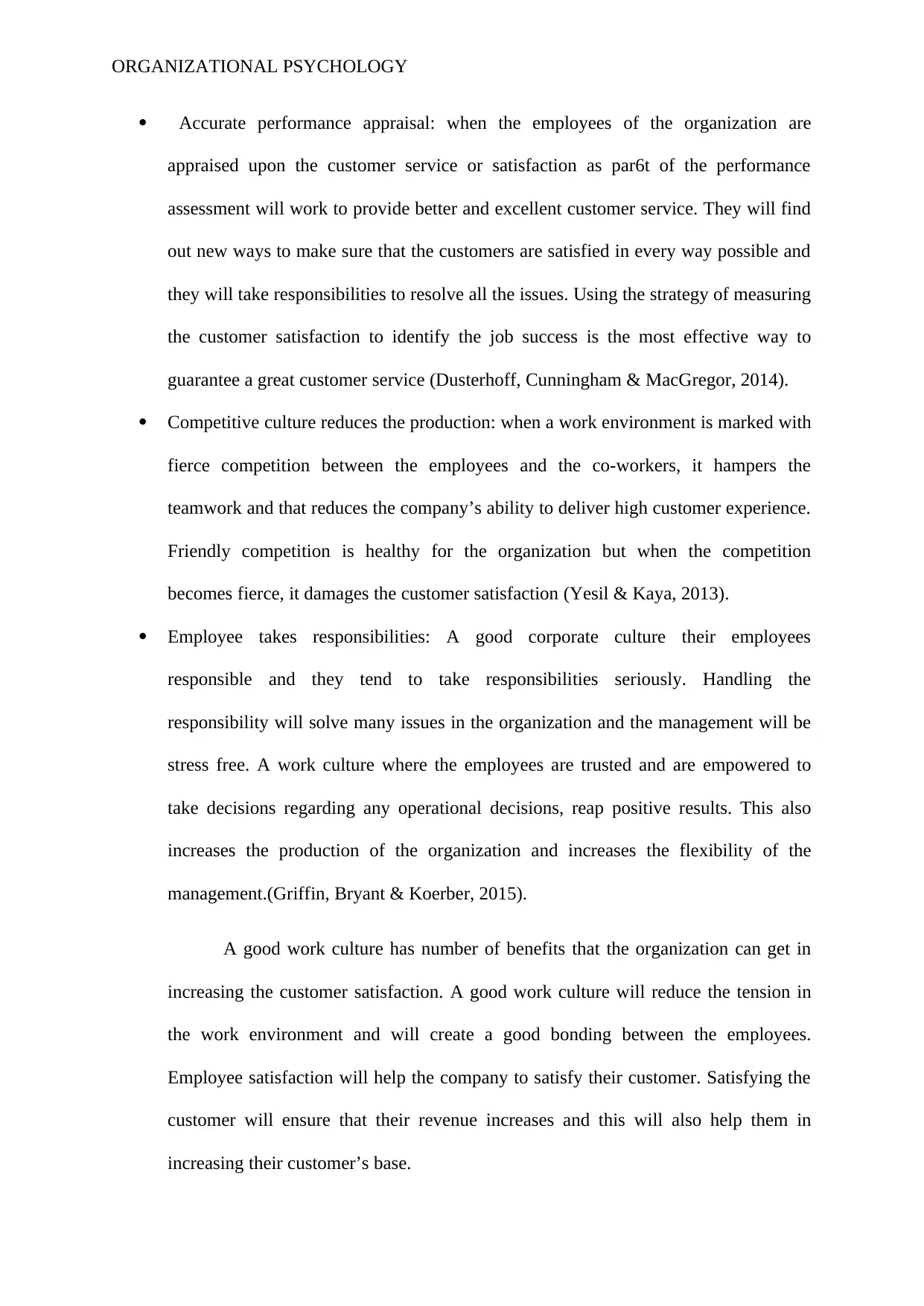
ORGANIZATIONAL PSYCHOLOGY
Accurate performance appraisal: when the employees of the organization are
appraised upon the customer service or satisfaction as par6t of the performance
assessment will work to provide better and excellent customer service. They will find
out new ways to make sure that the customers are satisfied in every way possible and
they will take responsibilities to resolve all the issues. Using the strategy of measuring
the customer satisfaction to identify the job success is the most effective way to
guarantee a great customer service (Dusterhoff, Cunningham & MacGregor, 2014).
Competitive culture reduces the production: when a work environment is marked with
fierce competition between the employees and the co-workers, it hampers the
teamwork and that reduces the company’s ability to deliver high customer experience.
Friendly competition is healthy for the organization but when the competition
becomes fierce, it damages the customer satisfaction (Yesil & Kaya, 2013).
Employee takes responsibilities: A good corporate culture their employees
responsible and they tend to take responsibilities seriously. Handling the
responsibility will solve many issues in the organization and the management will be
stress free. A work culture where the employees are trusted and are empowered to
take decisions regarding any operational decisions, reap positive results. This also
increases the production of the organization and increases the flexibility of the
management.(Griffin, Bryant & Koerber, 2015).
A good work culture has number of benefits that the organization can get in
increasing the customer satisfaction. A good work culture will reduce the tension in
the work environment and will create a good bonding between the employees.
Employee satisfaction will help the company to satisfy their customer. Satisfying the
customer will ensure that their revenue increases and this will also help them in
increasing their customer’s base.
Accurate performance appraisal: when the employees of the organization are
appraised upon the customer service or satisfaction as par6t of the performance
assessment will work to provide better and excellent customer service. They will find
out new ways to make sure that the customers are satisfied in every way possible and
they will take responsibilities to resolve all the issues. Using the strategy of measuring
the customer satisfaction to identify the job success is the most effective way to
guarantee a great customer service (Dusterhoff, Cunningham & MacGregor, 2014).
Competitive culture reduces the production: when a work environment is marked with
fierce competition between the employees and the co-workers, it hampers the
teamwork and that reduces the company’s ability to deliver high customer experience.
Friendly competition is healthy for the organization but when the competition
becomes fierce, it damages the customer satisfaction (Yesil & Kaya, 2013).
Employee takes responsibilities: A good corporate culture their employees
responsible and they tend to take responsibilities seriously. Handling the
responsibility will solve many issues in the organization and the management will be
stress free. A work culture where the employees are trusted and are empowered to
take decisions regarding any operational decisions, reap positive results. This also
increases the production of the organization and increases the flexibility of the
management.(Griffin, Bryant & Koerber, 2015).
A good work culture has number of benefits that the organization can get in
increasing the customer satisfaction. A good work culture will reduce the tension in
the work environment and will create a good bonding between the employees.
Employee satisfaction will help the company to satisfy their customer. Satisfying the
customer will ensure that their revenue increases and this will also help them in
increasing their customer’s base.
Paraphrase This Document
Need a fresh take? Get an instant paraphrase of this document with our AI Paraphraser

ORGANIZATIONAL PSYCHOLOGY
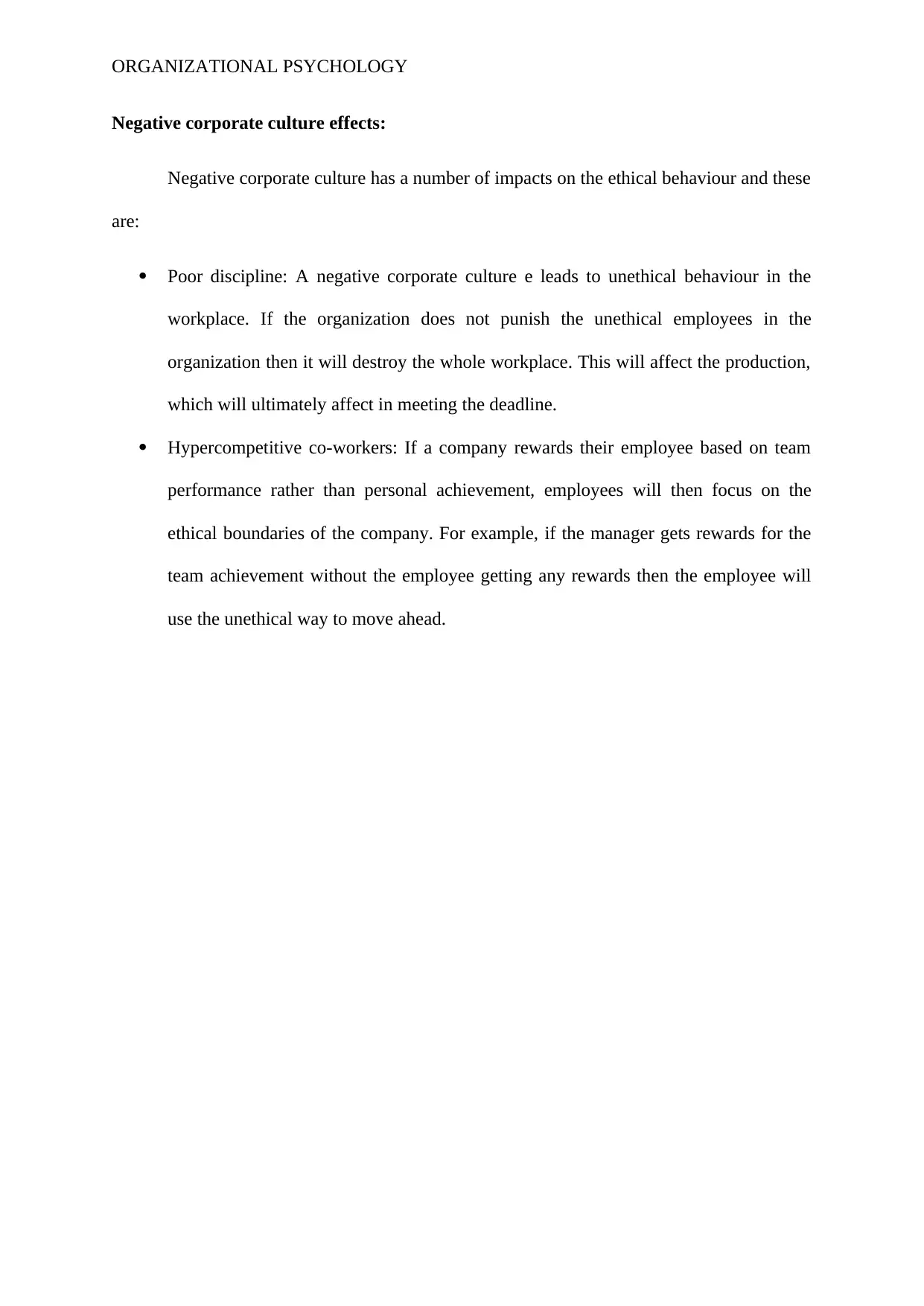
ORGANIZATIONAL PSYCHOLOGY
Negative corporate culture effects:
Negative corporate culture has a number of impacts on the ethical behaviour and these
are:
Poor discipline: A negative corporate culture e leads to unethical behaviour in the
workplace. If the organization does not punish the unethical employees in the
organization then it will destroy the whole workplace. This will affect the production,
which will ultimately affect in meeting the deadline.
Hypercompetitive co-workers: If a company rewards their employee based on team
performance rather than personal achievement, employees will then focus on the
ethical boundaries of the company. For example, if the manager gets rewards for the
team achievement without the employee getting any rewards then the employee will
use the unethical way to move ahead.
Negative corporate culture effects:
Negative corporate culture has a number of impacts on the ethical behaviour and these
are:
Poor discipline: A negative corporate culture e leads to unethical behaviour in the
workplace. If the organization does not punish the unethical employees in the
organization then it will destroy the whole workplace. This will affect the production,
which will ultimately affect in meeting the deadline.
Hypercompetitive co-workers: If a company rewards their employee based on team
performance rather than personal achievement, employees will then focus on the
ethical boundaries of the company. For example, if the manager gets rewards for the
team achievement without the employee getting any rewards then the employee will
use the unethical way to move ahead.
⊘ This is a preview!⊘
Do you want full access?
Subscribe today to unlock all pages.

Trusted by 1+ million students worldwide
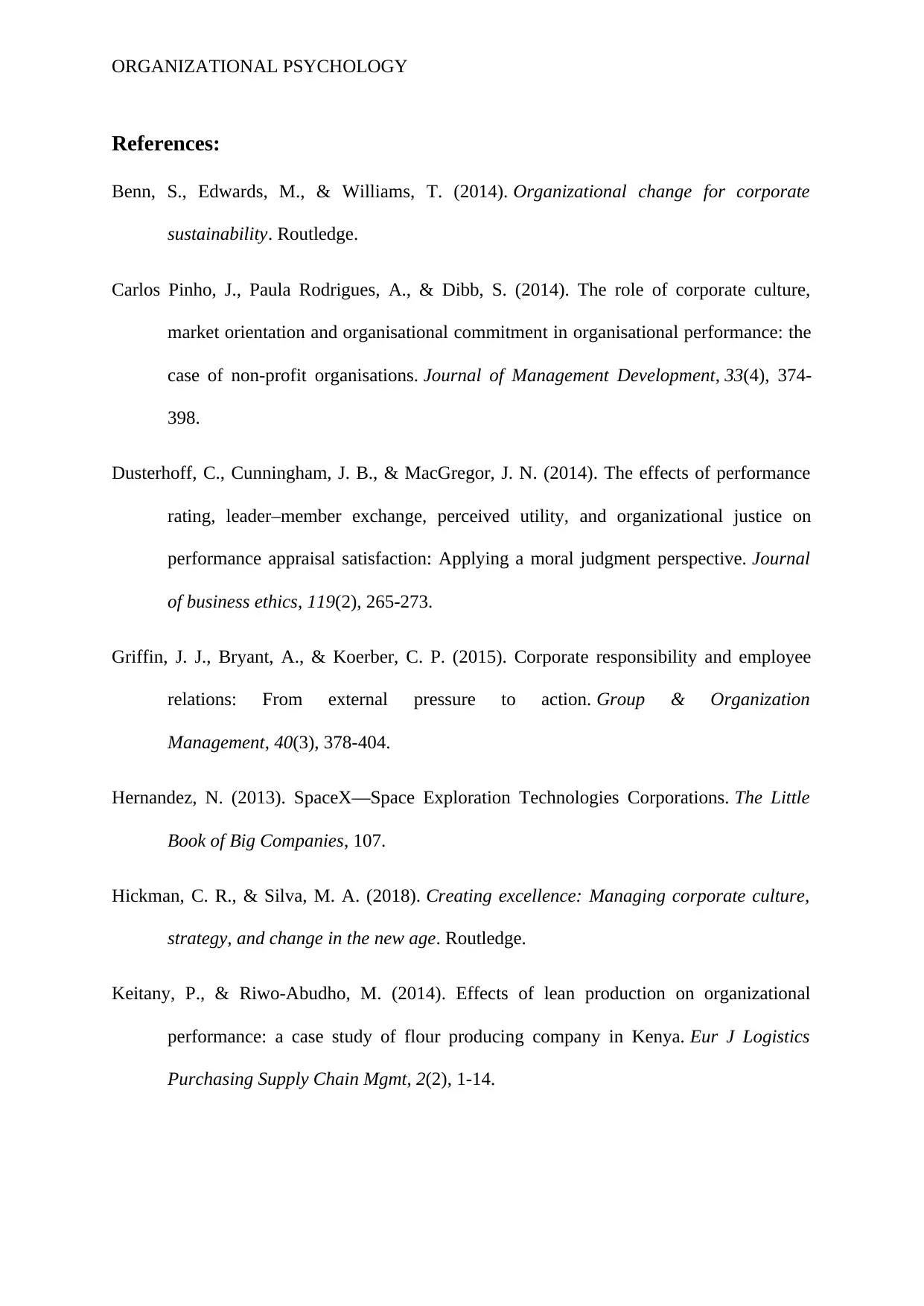
ORGANIZATIONAL PSYCHOLOGY
References:
Benn, S., Edwards, M., & Williams, T. (2014). Organizational change for corporate
sustainability. Routledge.
Carlos Pinho, J., Paula Rodrigues, A., & Dibb, S. (2014). The role of corporate culture,
market orientation and organisational commitment in organisational performance: the
case of non-profit organisations. Journal of Management Development, 33(4), 374-
398.
Dusterhoff, C., Cunningham, J. B., & MacGregor, J. N. (2014). The effects of performance
rating, leader–member exchange, perceived utility, and organizational justice on
performance appraisal satisfaction: Applying a moral judgment perspective. Journal
of business ethics, 119(2), 265-273.
Griffin, J. J., Bryant, A., & Koerber, C. P. (2015). Corporate responsibility and employee
relations: From external pressure to action. Group & Organization
Management, 40(3), 378-404.
Hernandez, N. (2013). SpaceX—Space Exploration Technologies Corporations. The Little
Book of Big Companies, 107.
Hickman, C. R., & Silva, M. A. (2018). Creating excellence: Managing corporate culture,
strategy, and change in the new age. Routledge.
Keitany, P., & Riwo-Abudho, M. (2014). Effects of lean production on organizational
performance: a case study of flour producing company in Kenya. Eur J Logistics
Purchasing Supply Chain Mgmt, 2(2), 1-14.
References:
Benn, S., Edwards, M., & Williams, T. (2014). Organizational change for corporate
sustainability. Routledge.
Carlos Pinho, J., Paula Rodrigues, A., & Dibb, S. (2014). The role of corporate culture,
market orientation and organisational commitment in organisational performance: the
case of non-profit organisations. Journal of Management Development, 33(4), 374-
398.
Dusterhoff, C., Cunningham, J. B., & MacGregor, J. N. (2014). The effects of performance
rating, leader–member exchange, perceived utility, and organizational justice on
performance appraisal satisfaction: Applying a moral judgment perspective. Journal
of business ethics, 119(2), 265-273.
Griffin, J. J., Bryant, A., & Koerber, C. P. (2015). Corporate responsibility and employee
relations: From external pressure to action. Group & Organization
Management, 40(3), 378-404.
Hernandez, N. (2013). SpaceX—Space Exploration Technologies Corporations. The Little
Book of Big Companies, 107.
Hickman, C. R., & Silva, M. A. (2018). Creating excellence: Managing corporate culture,
strategy, and change in the new age. Routledge.
Keitany, P., & Riwo-Abudho, M. (2014). Effects of lean production on organizational
performance: a case study of flour producing company in Kenya. Eur J Logistics
Purchasing Supply Chain Mgmt, 2(2), 1-14.
Paraphrase This Document
Need a fresh take? Get an instant paraphrase of this document with our AI Paraphraser
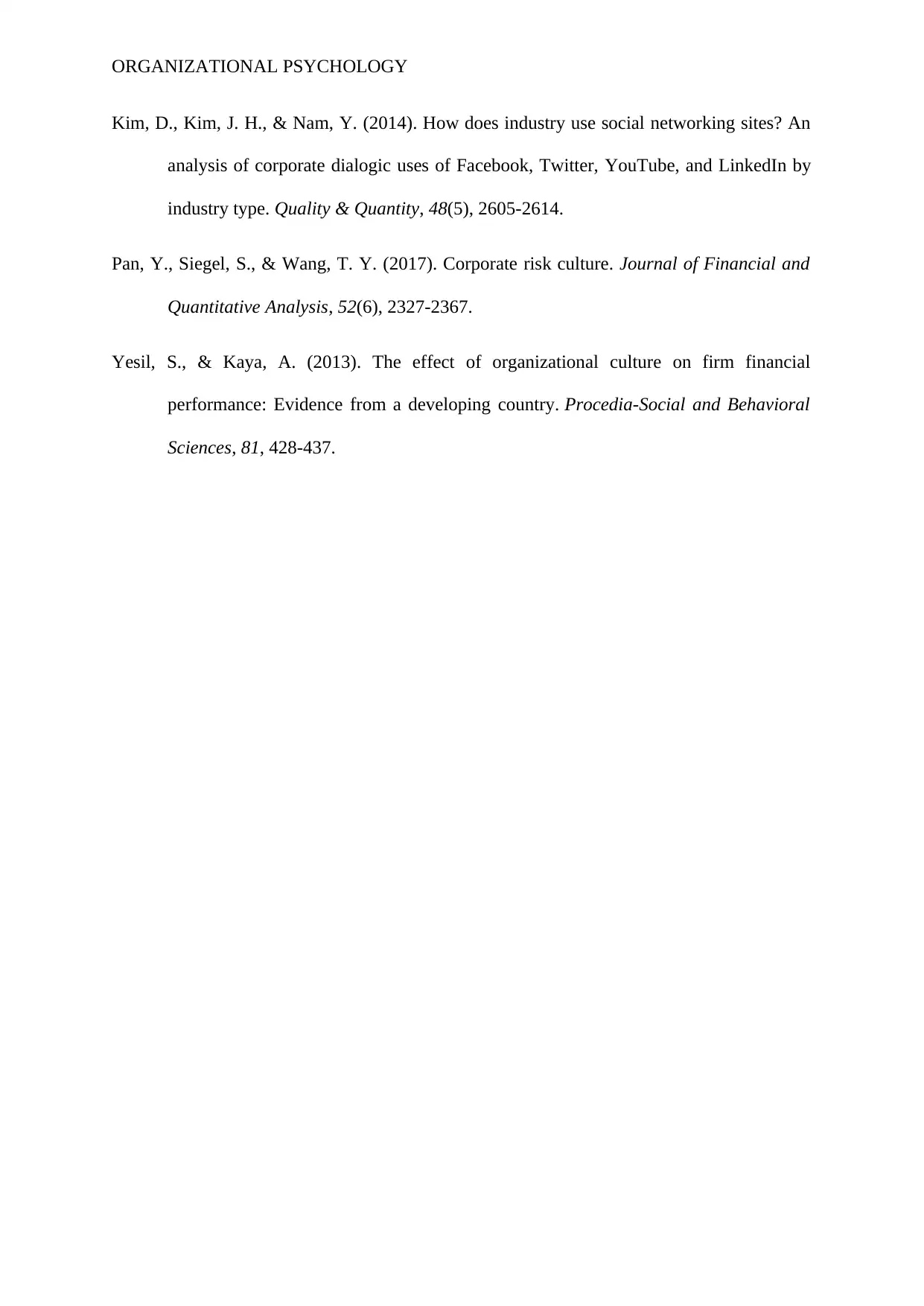
ORGANIZATIONAL PSYCHOLOGY
Kim, D., Kim, J. H., & Nam, Y. (2014). How does industry use social networking sites? An
analysis of corporate dialogic uses of Facebook, Twitter, YouTube, and LinkedIn by
industry type. Quality & Quantity, 48(5), 2605-2614.
Pan, Y., Siegel, S., & Wang, T. Y. (2017). Corporate risk culture. Journal of Financial and
Quantitative Analysis, 52(6), 2327-2367.
Yesil, S., & Kaya, A. (2013). The effect of organizational culture on firm financial
performance: Evidence from a developing country. Procedia-Social and Behavioral
Sciences, 81, 428-437.
Kim, D., Kim, J. H., & Nam, Y. (2014). How does industry use social networking sites? An
analysis of corporate dialogic uses of Facebook, Twitter, YouTube, and LinkedIn by
industry type. Quality & Quantity, 48(5), 2605-2614.
Pan, Y., Siegel, S., & Wang, T. Y. (2017). Corporate risk culture. Journal of Financial and
Quantitative Analysis, 52(6), 2327-2367.
Yesil, S., & Kaya, A. (2013). The effect of organizational culture on firm financial
performance: Evidence from a developing country. Procedia-Social and Behavioral
Sciences, 81, 428-437.

ORGANIZATIONAL PSYCHOLOGY
⊘ This is a preview!⊘
Do you want full access?
Subscribe today to unlock all pages.

Trusted by 1+ million students worldwide
1 out of 9
Related Documents
Your All-in-One AI-Powered Toolkit for Academic Success.
+13062052269
info@desklib.com
Available 24*7 on WhatsApp / Email
![[object Object]](/_next/static/media/star-bottom.7253800d.svg)
Unlock your academic potential
Copyright © 2020–2026 A2Z Services. All Rights Reserved. Developed and managed by ZUCOL.





